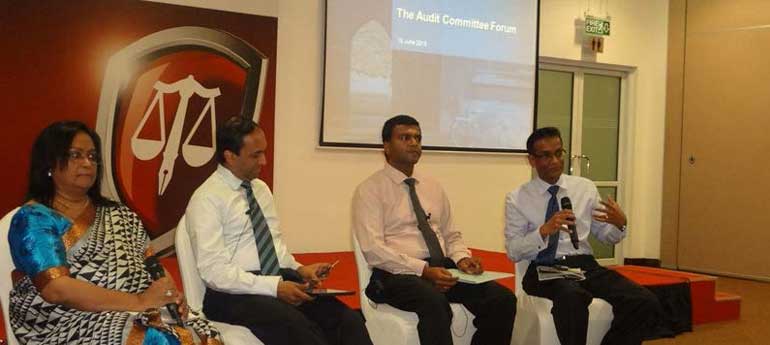Tuesday Feb 17, 2026
Tuesday Feb 17, 2026
Thursday, 2 July 2015 01:14 - - {{hitsCtrl.values.hits}}
 From left: Priyana Gunesekera, Rajeeva Bandaranaike, Harshana Suriyapperuma and Suren Rajakarier
From left: Priyana Gunesekera, Rajeeva Bandaranaike, Harshana Suriyapperuma and Suren Rajakarier
To even better understand the key regulatory requirements and Audit Committee (AC) priorities, the Audit Committee Forum organised its fifth evening presentation and panel discussion on 15 June at the Institute of Chartered Accountants of Sri Lanka. The event brought together Audit Committee Members and representatives of the Colombo Stock Exchange (CSE) and the Securities and Exchange Commission (SEC) to discuss key issues and challenges on relevant regulations and best practices with KPMG Partner Suren Rajakarier providing valuable insight for further discussions.
Setting the platform for discussion, key presenters CSE Chief Executive Officer Rajeeva Bandaranaike and SEC Director Corporate Affairs Harshana Suriyapperuma addressed the gathering on the current state of the capital market regulatory requirements and compliance expectations from a regulatory perspective.
Presenting at the forum, Bandaranaike outlined the relevant listing rules and spoke of non-compliance issues frequently encountered, which included non-disclosures and clear breaches of the rules making specific reference to:
He also referred to the responsibility of assessing ‘going concern’ status was particularly important. He further stated that regulators (for instance the Central Bank, SEC and IBSL) collaborated in their regulatory roles when needed. Referring to deficiencies on the part of ACs observed by the SEC in practice, he referred to instances of:
The presentations were followed by an interactive panel discussion moderated by Suren Rajakarier, Partner – Head of Audit, KPMG in Sri Lanka, which was the main highlight of the forum. The panel consisted of Rajeeva Bandaranaike, Chief Executive Officer, CSE, Priyana Gunesekera, Head of Listings & Corporate Affairs, CSE and Harshana Suriyapperuma, Director, Corporate Affairs, SEC.
Responding to a question on, why the AC should assume heightened responsibility, when the management has primary responsibility for their preparation, and auditors have responsibility for their audit, Suriyapperuma stated that the Board still remains primarily responsible for financial statements issued. He added that the responsibility of ACs is oversight – to gain assurance that proper procedure is in place on the preparation and presentation of the financial statements.
The panellists discussed the guidance on Related Party Transaction’s agreeing that the law and listing rules state what is mandatory and it is best to go beyond these, and be guided by principles to consider if the transactions and terms are in the best interest of the entity. The need to comply with the guideline on Minimum Public Holdings, which had been announced at the beginning of 2014 and would come into force on 31 December 2015 was also discussed.
Responding to a question on, why isn’t a policy of ‘name & shame’ followed, for market awareness and deterrence? It was stated that the regulator is beginning to follow a ‘name & shame’ policy, as evident recently.
The AC Forum hopes to continue similar knowledge sharing initiatives, bringing together professionals to share their expertise on topics that are of relevance to AC members. Commenting on the Forum, Suren Rajakarier said, “KPMG is pleased to continue to serve the Forum as a resource, sharing information relating to governance, risk management, developments in accounting and auditing requirements and to moderate the exchange of ideas at the roundtable discussions.